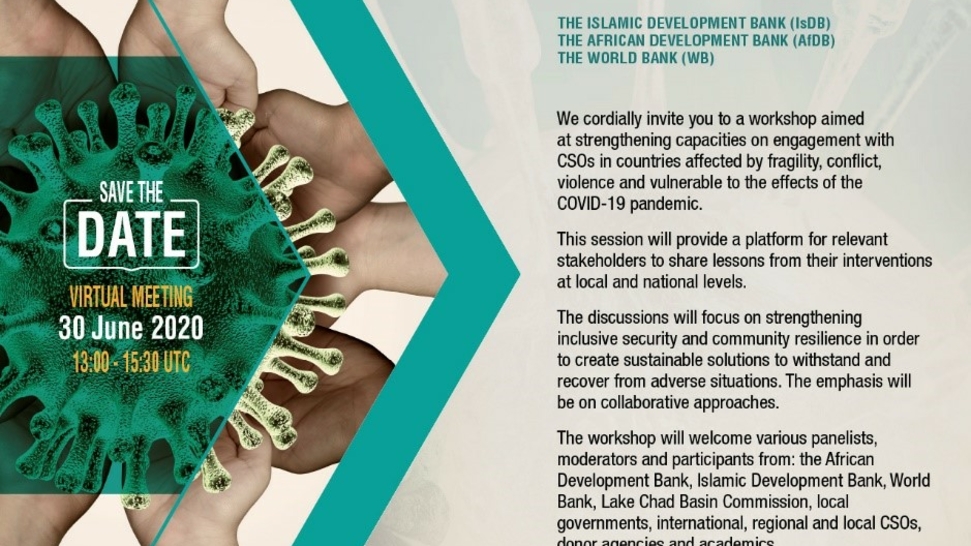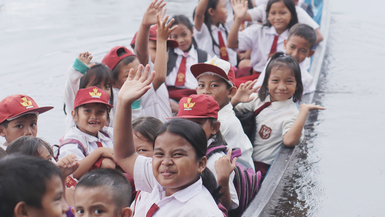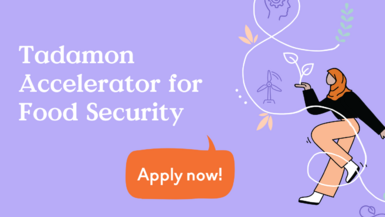
Online workshop
Enhancing Community Resilience and Security Amid COVID-19: From Emergency to Recovery
30 June 2020
Jointly Organised by:
The Islamic Development Bank (IsDB)
The African Development Bank (AfDB)
The World Bank
Participants: MDBs, International - Regional and Local CSOs, Governments, Donors, UN Agencies, and Academia representatives.
Background
A number of African countries are facing many complicated and diverse challenges encompassing all economic and social sectors. According to the African Development Bank1, the past decade, witnessed enormous growth and transformation that has expanded opportunities and improved living conditions for millions of people. More than two-thirds of African countries have strengthened their quality of governance, improved basic services, and expanded economic opportunities. Unfortunately, there are significant risks that this momentum could be undermined by important pressures such as continuing patterns of exclusion and poverty, unemployment, high migration, rapid urbanization, gender inequalities, climate change and environmental degradation as well as insecurity, diseases and epidemics. These all notably the current COVID19 pandemic pose a great threat that could overwhelm existing institutional capacities for managing political, economic, social and environmental challenges. These pressures are making every single African country more vulnerable and there are currently, more than 250 million Africans affected by fragility, with significant regional spill-over effects. Development prospects in four major regions (Horn of Africa, Sahel, Mano River Union and Great Lakes and Central Africa region) are particularly at risk. To address critical skills gaps and human resources needs, both in the public and the private sector, the Bank is leveraging on human capacity and harnessing the potential of the Diaspora, CSOs and the private sector because limited capacity of the state and other key actors contributes to fragility.
The Bank has launched on 11 June, a $ 20 million grant for G5 Sahel countries, in the framework of its COVID-19 Response Facility, to tackle the spread of the coronavirus and enable the most vulnerable communities to increase their resilience, especially internally displaced people, as well as refugees and their host communities. An additional $ 1.37 million grant from the Bank's transition support facility is also planned.
The Islamic Development Bank recognizes the diverse needs, trajectories and the levels of fragility and stages of development of its 57 Member Countries especially including in Africa. In view of the above-mentioned challenges, the IsDB has developed several frameworks for its interventions centred, among others, on (i) the dual challenges for addressing fragility and conflict and building resilience; (ii) the empowerment and systematic engagement with CSOs to improve the living conditions of vulnerable communities and contribute to their sustainable development through transformative humanitarian and development interventions; and (iii) managing risks and shocks of natural disasters. As an example, CSOs have been previously implementing agents for several projects financed by IsDB-managed Trust Funds, which received significant donor funding (around $3.0 billion) for addressing humanitarian problems in conflict and crisis countries aimed at vulnerable and disadvantaged groups.
Given the cross-border nature of conflicts in Africa, the World Bank is employing an approach that simultaneously focuses on the drivers of fragility while also supporting well-targeted regional initiatives to create opportunities for peace and shared prosperity. In conflict hotspots such as the Sahel, the Horn of Africa, and the Lake Chad region, the World Bank is rehabilitating
1 The African Development Bank, Strategy for Addressing Fragility and Building Resilience in Africa (2014-2019)
key infrastructure, developing economic opportunities, and building capacity of regional and local authorities as well as civil society. The World Bank is providing $2 billion to help low-income countries that are hosting large numbers of refugees—such as Cameroon, Chad, Ethiopia, Niger, Republic of Congo, and Uganda— through programs that create jobs and opportunities, build the resilience of local institutions, promote pro-refugee policies, and foster social cohesion.
The Islamic Development Bank, the African Development Bank and the World Bank recognize the important role of CSOs as valuable partners and stakeholders in the humanitarian and development sectors, as they help in the short run, to promote and strengthen efforts towards easing the suffering of people affected and can contribute in the long term to sustainable development in affected communities. Their immediate interventions (rather than long term actions) is valuable in promoting, inter alia, integration, economic empowerment, resource mobilization as well as complementing governments’ actions in situation of crises. Strengthening the humanitarian-development nexus that was identified by stakeholders as a top priority at the World Humanitarian Summit (WHS) of 2016 requires working towards achieving collective outcomes that reduce need, risk and vulnerability, over multiple years, based on the comparative advantage of a diverse range of actors. This is in line with the New Way of Working (NWOW) outlined by international humanitarian and development partners
The IsDB and the AfDB have developed organization-wide policies2 and strategic framework for improving the effective engagement with CSOs with the objectives, among others, to: (i) create frameworks of dialogue and consultation with CSOs in order to foster the sharing of knowledge and experiences; and (ii) improve their assistance to local hard-to-reach communities. In this regard. They are striving to build resilience and to support development that mitigates the risks of conflict and violence by addressing the drivers of fragility and paving the way for a more resilient and inclusive development trajectory.
Rationale
Against this background, both parties (IsDB and the AfDB) in partnership with the World Bank shall be jointly organizing a workshop entitled "Enhancing Security and Community Resilience Amid COVID-19: From Emergency to Recovery" with the aim of strengthening the capacity of CSOs in countries affected by fragility, conflict, violence and vulnerable to the effects of the COVID19 pandemic. Following its outbreak in Africa, Governments and development actors have developed strategic responses to effectively provide immediate and long-term support to communities affected by the impacts of COVID19. To expeditiously respond to the urgent needs, particular emphasis has been put on the critical roles of the public, private and civil society in effectively and efficiently responding to COVID19 and building resilience.
2 AfDB Strategic Framework for Civil Society Engagement; IsDB Civil Society Engagement Policy, 2019
This webinar shall provide a platform for sharing lessons from the interventions that CSOs are undertaking at local and national levels to respond to the Pandemic under emergency conditions and drawing lessons on what is working and what more needs to be done to prevent the spread of the disease, save lives and build community resilience.
The webinar shall focus on the pandemic and the resultant emergency response and address themes such as frontline experiences of CSOs in food security, community mobilization and sensitization, gender mainstreaming and the use of innovative technology and ICT in the context of COVID19. As the global response transitions from emergency response to long-term reconstruction, the next stage of these series will similarly focus on themes central to the elaboration of new frameworks that will be required to facilitate recovery, build resilience, and adapt institutions and systems to the realities of post-COVID19 societies.
The webinar shall cover pertinent thematic areas that will provide stakeholders with relevant information, skills and tools for operating in humanitarian situations and to work towards building resilience while ensuring long-term sustainable development.
After this first webinar, a Capacity Building Workshop shall be jointly organized on the broader theme of addressing fragility and building resilience in countries affected by fragility, violence and conflict
Objectives
✓ To provide a platform for the sharing of experiences, challenges and lessons learned by humanitarian and development CSOs and key actors in conflict-affected and fragile member countries in Africa based on the COVID19 experience. This will be done through information exchange on risk assessment and prevention, security, community resilience and resources mobilization
✓ To share information and strengthen knowledge of CSOs on how the IsDB, the AfDB and the World Bank are supporting Members Countries to combat COVID19 while addressing fragility, security and building resilience.
The workshop will adopt a consultative thematic format with keynote speeches, and plenary sessions with panelists from relevant organizations (INGOs, local NGOs, Governments, international development institutions and other keys actors).
Workshop outputs
1. Initiatives of the CSOs, Multilateral Development Banks and development partners in the fight against COVID19, in terms of building the resilience and security of vulnerable communities, are discussed and feedback received.
2. Information and knowledge, lessons learned on the work of CSOs, regional institutions, that are combatting COVID19 and its effects (addressing fragility, security, building resilience of vulnerable communities).


